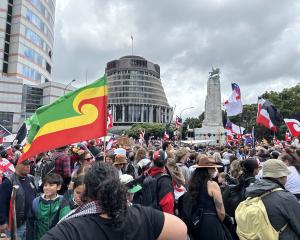
Tenā koe Prime Minister.
You may recall that on the evening you won the election I sent you a text congratulating you but also noting that, while I had given National my vote for only the third time in more than 50 years of voting, I looked forward to measuring the personal key performance indicators (KPIs) I had set for earning that vote in three years’ time.
I totally accept that the KPIs I set may not align with the majority of voters, but that’s what democracy is all about: that’s how I put a value on the importance of having the right to vote.
I would have to say that things have not gone all that well when measuring your performance against the KPIs I had set for where I place my vote next time.
First there was a coalition agreement that gave two minority parties an unprecedented amount of power and leverage. The warning signs were there from the start when the leaders of those two parties put their focus on who was going to be the deputy prime minister.
Really? Political baubles was what was keeping them up at night. Not a great start.
Then came the unravelling of the slow but positive steps that had been taken in the acknowledgement of Te Tiriti as our founding document and the use of te reo Māori as one of the two official languages of Aotearoa New Zealand.
The irony (and you will see that word a few times in this letter) is that you had once been the chief executive of Air New Zealand, the company that proudly and unequivocally lead the corporate world in its embrace of te reo and te ao Māori.
I am no longer sure where you stand on this important issue because last week you dismissed Minister for Treaty of Waitangi Negotiations Paul Goldsmith’s decision to remove Māori text — including the word Aotearoa, from a letter of invitation to Australia to celebrate Matariki — as trying to make things simpler for our cuzzies across the ditch. Really?
A celebration of the most significant Māori event of the year and Mr Goldsmith chooses this as his vehicle for putting his stake in the ground on the use of te reo.
It is wrong on so many levels, but here’s what offends me most. On my Māori side I am angered by the arrogance of Mr Goldsmith’s total disregard for the language and heritage of my mother, while on my pakeha side I am embarrassed by — well, how do I put this — ah yes, the arrogance of Mr Goldsmith’s total disregard for the language and heritage of my mother.
And, if removing te reo from a letter of invitation to a celebration of the Māori New Year is not irony enough for you, how about this for irony? Last week you made an announcement around education, at the core of which was the importance of structured numeracy and literacy.
Well, Prime Minister, a letter is about as structured as literacy can get. There is a form that everyone knows and understands. Even politicians. That structure has an opening greeting or salutation, followed by the content of the letter, and finishes with a closing. Literacy doesn’t come any more structured than that.
What did Mr Goldsmith remove from his letter to make things simpler for his colleagues in Australia?
"Tenā koe" — the opening salutation — which I am sure even an Australian politician would be able to discern from where it sat in the structure, was the equivalent of "gidday mate".
Then he took to the closing, "naku noa nā" (yours sincerely), which his Aussie invitees could easily translate to "see you at the barbie".
But, here’s another irony. They would be unlikely to do those translations because, as you might recall, your Australian colleagues in the current government tried valiantly to give voice to their indigenous people with the Voice referendum last year. They lost that referendum but there was no doubt that New Zealand was their role model, their inspiration, in their attempt to give their indigenous people a voice.
Mr Goldsmith appears to have sided with the Australians who voted it down.
I am not sure if this next example ranks as an irony, but in the opening of the Paris Olympics the only indigenous greeting I heard used by the BBC commentators covering the teams as they sailed down the Seine was "kia ora New Zealand".
I am sure Dame Naida Glavish would have viewed this global acknowledgement of the work she began 40 years ago, by refusing to back down from using "kia ora" when answering the phone at the Auckland Post Office, with an enormous sense of pride. The world acknowledged her work and culture.
How must she have felt to see a minister of the Crown, 40 years later, order the removal of the most basic use of te reo in a letter of invitation to the celebration of Matariki? Would he have threatened to fire his staff if they refused, as she did?
And, remaining on the topic of education, is your statement that "music and arts was not a priority and should be deferred in favour of maths and writing".
Well, this is from someone whose first job was as a singer in a rock’n’roll band in the 60s. For what it’s worth, we even opened for the Beach Boys when they toured New Zealand.
For years I have argued that we need to introduce "A" into the concept of Stem because I have seen firsthand how important the arts and creative thinking is to the global technology business.
One of the most valuable lessons I ever got was from the University of Otago computer graphics department head Prof Geoff Wyvill who, in 1990, told me anyone wanting to excel in that field should first learn another language and do music.
He trained the university programming team who, in 1989, went to the United States and beat Harvard, Stanford, Caltech and Massachusetts Institute of Technology — just to name a few — in the World Computer Programming Championship, becoming the first non-American team ever to do so. I think I know where I would put my money when it comes to taking advice on the importance of art and creative thinking in education.
With the advent of AI that has become even more important. I am seeing evidence of that every day as we take on the world from Aotearoa.
Our tamariki are going to have instant access to the biggest source of knowledge on the planet. Our education system has to prepare them for this. It’s not simply maths and literacy that will help them take up the opportunities this will create.
It’s enhancing the ability that humans have to think creatively that makes us who we are. We need to put the arts in Stem while we still have time.
I am watching those KPIs
Kia pai tō rā — have a nice day.
— Sir Ian Taylor is founder and managing director of Dunedin company Animation Research.











